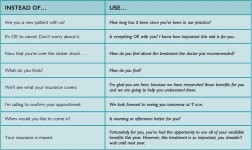
The Right Phrases Can Improve Communication.
Albert Einstein is quoted as saying, “The significant problems we face cannot be solved at the same level of thinking we were at when we created them.” In all my years in dentistry and in working with offices across America, I have found that miscommunication (the failure to communicate clearly) can create a lot of problems. The good news is that we can learn good communication by simply using words that work to solve the problems that (as the quote by Einstein suggests) we created in the first place.
I started paying attention to specific words and their effects in 1984. I was working in a dental practice and considered myself an empathetic individual, and yet sometimes I didn’t know exactly what to say to patients. Even though I was kind to people, I wasn’t using the right words to help our practice grow. After I learned the Dr. Dick Barnes structure and began to implement it, everything began to improve in our practice. Using words that work can have an enormous effect on getting patients in the door and helping them get important treatment. I will give you examples of the right words—use these words in place of the words and phrases that you normally use. The suggestions that follow are just one part of the Dr. Dick Barnes structure that I found effective. I know they will help in your practice, too.
The best way that I can show the importance of using the right words is to give examples of a variety of situations in which the wrong words are commonly used. By illustrating the effects of the wrong words, you’ll have a better understanding of why the right words are so important. Using the right words makes a big difference in a variety of situations.
Everyday Calls
Typically, dental practices receive inbound calls (such as new patient calls, scheduling calls, cancellation calls, shopper calls, and emergency calls) and make outbound calls (such as confirmation calls) each day.
New Patient Calls
When a new patient calls a dental practice, employees often ask, “Are you a new patient with us?” That phrase seems like a normal question, but it’s inappropriate—it’s using the wrong words. This question, while often sincere, is sometimes embarrassing for patients. It’s embarrassing because perhaps the caller is an existing patient who just hasn’t been to the office in a long time. By asking callers if they are new, it sends a message that they weren’t important and that you don’t remember them.
Once I was guilty of asking that question and I embarrassed both the patient and myself. The patient said, “Oh, I haven’t been there for a long time, but I felt like I paid for the dentist’s house and car many years ago.”
To avoid this embarrassing situation, the right question to ask is, “How long has it been since you’ve been in our practice?” Simply phrasing the question differently eliminates any possible embarrassment for patients and staff members. If the patient actually is a new patient, he or she will simply state that they are new. Existing patients who haven’t been to the office for a while will confirm how long it’s been since their last appointment.
Scheduling Calls
Similarly, when scheduling appointments, many staff members ask patients, “When would you like to come in?” Such a question seems accommodating, but it doesn’t get dental practices the response they want. Patients typically respond in one of two ways—they say they never want to come in, or they say, “I either want to come really early or really late, because I have a job.”
A simple word change can resolve this issue. For a prophylaxis caller, ask, “Is morning or afternoon better for you?” With those words, you control where the patient fits in the schedule. So many dental practices tell me, “Well my patients can only come during this time,” and it’s not necessarily true.
When you clearly communicate the importance of getting dental work done, patients will stop telling you when they want to come in and instead they will ask, “How soon can I get started?” You can respond, “The doctor does those procedures during these particular times.”
Cancellation Calls
Patient cancellations can be a complicated issue. From a business perspective, if all the patients cancel, who pays the bills? On the other hand, you never want to turn the patient into the bad guy. Sometimes I hear staff members tell patients, “We have reserved this time for you.” That is neither appropriate nor effective because the patient is not concerned about the doctor’s time or they wouldn’t be cancelling. Patients often don’t realize that they cost the office money by not showing up.
After a cancellation call, I often hear staff members say, “Oh, that’s OK. Don’t worry about it.” From a business perspective, it really is not OK! So what are the right words that will strike a balance between these two extreme responses? Ask the patient, “Is everything OK with you? I know how important this visit is for you because of . . . .” This is when you bring up health issues or the other reasons why the appointment is important.
Be careful to use exactly these words. One time, a front office person told me this approach didn’t work for her. When I asked her to repeat exactly what she said, she raised her voice and responded (as if she were speaking to the patient), “OMG! Are you all right?” In this case, the front office person didn’t use the right words, she used her own words. Never say OMG! And the tone of your voice is very important. Make sure your tone is even and calm. Try not to react. I realize how important it is for patients to show up, because dentistry affects the overall health of the patients. However, a loud or harsh tone can cause patients to react, often negatively.
Shopper Calls
The purpose of every phone call is to get the patient in the door. Yet when someone calls and asks, “How much do you charge for a crown?” I often hear the receptionist quote a fee. Then the patient says, “thank you,” and hangs up. That approach isn’t effective for a growing business. The goal is to get patients in the door, and too many times staff members are too quick to give yes-and-no answers or to simply name a fee.
In my Total Team Training course, I explain how to get patients in the door by asking more questions. Instead of quoting a fee, the right words to use are, “Has someone told you that you need a crown?” If the response is yes, then the staff member should ask, “Is that a full porcelain crown? Or a porcelain fused to high-noble metal? Or porcelain-fused to a semi-precious metal? Could it be a full-metal crown with precious, or semi-precious?” The front office person should say anything that he or she knows about crowns! Doing so communicates that crowns have many variables. Then invite the patient to come into the office so the doctor can discern exactly which crown is best for the patient.
Once the office knows what the patient wants and needs, a staff member can discuss fees with the patient. (Of course, this technique doesn’t just work for crowns, it works for any other procedures a caller may inquire about.) Usually, callers don’t know what kind of crown they may need, so you can say, “Let’s do this,” which are very kind words. Say, “Let’s do this. Come in and meet our dentist. He [or she] is amazing. In fact, I don’t believe you would ever have a crown so good until you’ve had one from our dentist. The doctor will take a look at that tooth and recommend the crown that he [or she] believes is appropriate for it. Just come in so we can look at that one tooth and it would be no charge for the visit. Is that OK with you?”
After you get patients in the door, you can go from there. The initial visit for such a call is never more than 20 minutes of chair time, so you’re not giving away the work. You are not going to do the crown that day—just start to build a relationship.
Emergency Calls
Another common scenario is a call from an emergency patient. In this situation, the first step is to discern whether the caller has a true emergency. Too many times, patients with toothaches call and afterward, the receptionist says, “Oh, I’m sure they were drug seekers and we don’t have time for them.” It is important to ask questions of all callers and listen to the responses before making any judgments. At Total Team Training, we teach the qualifying questions.
Once you’ve discerned that a caller has a true emergency, say, “You definitely called the right office. We can help.” Then continue with, “The doctor has a really busy schedule today. She [or he] will want to see you and we’ll do something today to help you get out of pain.” And then tell the patient when they can come in. “We can work you in to our schedule at . . . [include a specific time].” You should also tell the patient what’s going to happen. For example, “The doctor will take an X-ray of the tooth and will do something today to help you get out of pain.” Those are the words that matter to a patient who is really hurting.
Once the patient is in the office, handle only the emergency. Do not to turn the emergency visit into a comprehensive exam, because the patient didn’t anticipate that. Too many times, offices don’t listen to patients and just tell them, “Well, since you’re here, we’ll go ahead and take a look at everything today.”
Some offices lose emergency patients because they jump into a comprehensive exam on this appointment. When patients are hurting, they can’t even think straight. At that time, patients are not ready to listen to the results of a comprehensive exam.
With emergency callers, the doctor should make the patient comfortable and let the patient know what is required to restore the tooth or to alleviate the pain. Once the patient is comfortable, the doctor can ask, “I bet you don’t ever want to hurt like that again, do you?” Without a doubt, the response will be, “No. I don’t ever want to hurt like that again!” The doctor can then respond with, “The good news is you don’t have to hurt like that again. What we’re doing today is only temporary, so when you return for the treatment to restore the tooth permanently, we’ll allow extra time and take a look at everything. Is that OK with you?” After we began using those words in the practice where I worked, it was amazing how many emergency patients returned for comprehensive appointments.
Confirmation Calls
Even though all dental practices call to confirm patient appointments, I don’t ever use the word “confirm” with patients. The word literally sounds harsh and often puts people on the defensive. I also don’t like to use the word “remind,” because reminding someone of an appointment can be insulting. Nor do I recommend using the phrase, “Let me know if this doesn’t work for you.” If you say such phrases, you’ve given patients an easy out.
Instead, the appropriate words are, “We look forward to seeing you tomorrow at 9 a.m.” Then reiterate what’s going to happen during the appointment. For example, “You’re going to see our hygienist, Belle, for your cleaning and exam appointment. She’s looking forward to seeing you.”
Money Talks
It’s not just in telephone conversations that the right words are important. I shudder to think of inappropriate comments I’ve heard financial coordinators make directly to patients. In one situation, after the doctor presented treatment, I overheard a financial coordinator say to a patient, “Now that you’re over the sticker shock . . . .” Those words immediately put a negative reaction into the patient’s mind.
Another group teaches dental practices to ask, “What would keep you from moving forward with treatment?” That is also an inappropriate question because the patient immediately begins to think of all the reasons for not proceeding with treatment. Patients instantly think of such things as ‘It’s a lot of money. I need a new car. I’ve got a wedding coming up,’ etc.
The right words to ask are, “How do you feel about the treatment the doctor just recommended for you?” And then let the patient talk about it. Don’t ever ask the open-ended question, “What do you think?” because sometimes patients think, ‘I cannot do this.’
If patients feel that the doctor’s diagnosis is in their best interest, most will say, “I want it. I just don’t know how I’m going to take care of it.” Once patients confirm that they want treatment, it becomes a question of finances and the practice just needs to help the patient find a way to pay for it.
Insurance Questions
Today, many dental offices are very insurance-driven. Often, prospective patients will call the office to find out whether the dentist accepts their insurance. Too many offices respond with, “No. I’m sorry, we don’t,” and just hang up! Don’t assume that just because you’re not a participating provider, a patient will automatically reject your office. If you’re not a participating provider, you should be honest with the patient, but you can still work with them.
A good response to a patient whose insurance is not accepted is, “We are not a participating provider with your particular insurance plan. However, we receive all new patients here and will be happy to research your insurance benefits, file your claims, and help you with your reimbursement.”
Then if the patient says, “If you don’t take my insurance, I probably am not going to come there,” you can respond, “I believe it would be your loss to never meet our dentist, and I know you would never have a crown as good as the one you would have from him [or her]. But you know what the greatest loss of all would be? We all would miss the opportunity to meet you. So let’s do this. Let’s have you come in and meet him [or her] and take a look at that one tooth.” Remember, you want to get the patient in the door and build the relationship, but you have to know the right words to say. Words do matter.
When working with existing patients, I hear too many dental employees say, “We’ll see what your insurance covers.” Such a statement implies that if insurance doesn’t pay for it, the treatment is not important. Change the focus from what insurance will cover to helping the patient understand the benefits of their insurance plan. The right words are, “I’m glad you’re here, because we have researched those benefits for you and we are going to help you to understand them.”
Measuring Success
The number one clue that you need to change your words is if patients are reacting and not responding. I don’t want patients to react, I want them to respond. There’s a difference.
What is the difference between a reaction and a response? Consider this: the words “adverse” and “reaction” are often paired. You may think of it in terms of having a reaction to a medication or something that you are allergic to. That’s bad. That affects you negatively.
If you find that patients are reacting in the same way they always have (“I’m not going to do what you ask me to do”), or you don’t ever get the patients scheduled, or they become defensive, then you have not used the right words.
We want patients to respond. When you respond to something, it’s good. When you’re ill and you’re on a medication that has been prescribed, you begin to respond to the medication and you get well.
In order for the words to get the right response, staff members must change the words they use. Part of this is committing certain phrases to memory. Memorization helps, and so does repetition. In the office where I worked, we always held each other accountable. I told my co-workers to remind me if I slipped up and said the words that I used to say. We didn’t correct each other in front of patients, of course, but we really meant business.
As you begin to memorize and employ the words that work, you can measure yourself by the patient’s response or reaction. When you get off the phone or a patient is standing in front you, ask yourself if they reacted or responded. That should motivate any person who wants there to be a difference.
Why the Right Words
Once again, words do matter. The right words get results and the wrong ones don’t. Even the smallest change will make a big difference. Just tweak your words and ask, “How do you feel?” instead of, “What do you think?” It may seem insignificant, however, it can significantly change the results. The right words make a difference because they ensure that everyone—staff members and patients—are on the same page. If everyone uses the same words and the same phrases, the outcome is predictable and everything works together. The right words are important in a variety of situations—not just phone calls. In my Total Team Training class, we discuss using the proper terms in other situations, such as resolving patient concerns, overcoming objections and much more.
As Albert Einstein indicated, the significant problems that we face are of our own making. We created the problem. It means that you are accountable for the way your patients react. With that responsibility, you will naturally want to use the right words. Measure the results and see what changes the right words will make in your practice.










